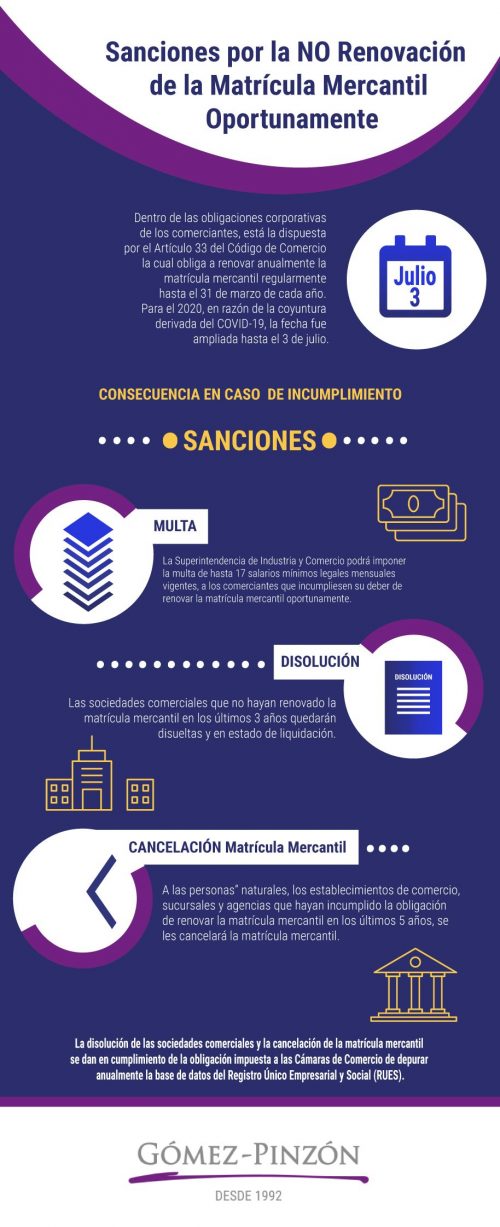
Gómez-Pinzón is among the most recognized firms for the level of experience in corporate law .
The Firm handles a wide range of corporate matters such as mergers, spin-offs, incorporations and liquidations, up to the drafting of contracts, the structuring of complex corporate reorganizations, foreign exchange matters and Accompaniment in making sensitive decisions on client boards of directors.
The award of shares in a succession and the right of preference in a Simplified Joint Stock Company.
In this regard, said entity is of the opinion that when the owner of some shares in a SAS dies, the inheritance regime must be strictly applied as a special rule of public order. Consequently, it is not possible, under any circumstances, to evade the succession process by means of a statutory provision that transfers the ownership of the SAS shares to another of the company’s shareholders. However, the same entity has affirmed that it is possible to apply the inheritance regime in testamentary matters, with which, the holder of the SAS shares can award them to the person he deems appropriate by will.
Now, what happens with the right of first refusal in front of a succession procedure when it has been agreed in the statutes of the SAS? In this regard, the Superintendency of Companies is of the opinion ( Official Letter No. 220-152295 of November 13, 2015 ), which, for the application of the right of first refusal, the criterion that must be used is that of voluntariness of the act. In the case of a transfer of shares by succession or due to death, to the extent that the shareholder’s will is not what originates the transfer of the shares, in accordance with the succession rules of the Civil Code, they must be transferred to their heirs without taking into account the right of first refusal established in the statutes. Thus, neither the company nor its other shareholders may oppose or claim to demand compliance with the preferential right agreed by law.
On the other hand, in the event that the shares of a SAS have been contributed by the deceased before his death to an autonomous patrimony as trust movable property, with the instruction that in the event of his death the shares are transferred to the other shareholders of the company (in order to avoid the participation of third parties in the company), once the condition of their death has been fulfilled, the shares will be transferred to the other shareholders in accordance with the rules provided in the trust agreement.
Now, what happens to the fiduciary rights that were owned by the deceased shareholder?
They will become part of the deceased shareholder’s estate, so that if the autonomous estate is liquidated, the heirs to whom they were awarded in the succession process, will receive the benefits that the liquidation yields in their favor and they will not be represented in the shares of the SAS.
Source: Official Letter from the Superintendency of Companies No. 220-000051 of January 02, 2020 and Official Letter from the Superintendency of Companies No. 220-152295 of November 13, 2015.
Entity Competent to Authorize a Statutory Reform of Merger or Spin-off of a Supervised Company the Superintendence of Home Public Services
The debate has focused on the Civil Service and Consultation Room of the State Council, which in 2010 and 2018 set a precedent by declaring that the competence to exercise inspection, surveillance and control and additionally to authorize business reorganization in spin-off reforms or business integration, corresponded to the SSPD. However, in a recent pronouncement of October 29, 2019, the State Council changed its position considering that although the SSPD exercises inspection, surveillance and control over corporate matters, it lacks the competence to authorize statutory merger or spin-off reforms, and that on the contrary is the competence of the Superintendency of Companies. The foregoing in development of article 228 of Law 222 of 1995, where when referring to residual competence it is established that the powers expressly assigned in the law in matters of surveillance and control will be exercised by the superintendency that exercises surveillance over the respective entity. Therefore, otherwise, it is up to the Superintendency of Companies to exercise them, except in the case of companies supervised by the Financial Superintendency.
It is worth noting that when the public service company object of the reform has securities registered in the National Registry of Securities and Issuers – RNVE, the Financial Superintendence of Colombia will have exclusive concurrent control to verify that its operations comply with the regulations that regulate the stock market and ensure the timeliness and sufficiency of the information of such issuers in the stock market. In this case, the Superintendency of Companies will be competent to authorize the respective statutory reform that contains the respective division or merger.
Source: Official Letter from the Superintendency of Companies No. 220-033279 of February 17, 2020.
Infographics: Sanctions for Non-Renewal of Commercial Registration

